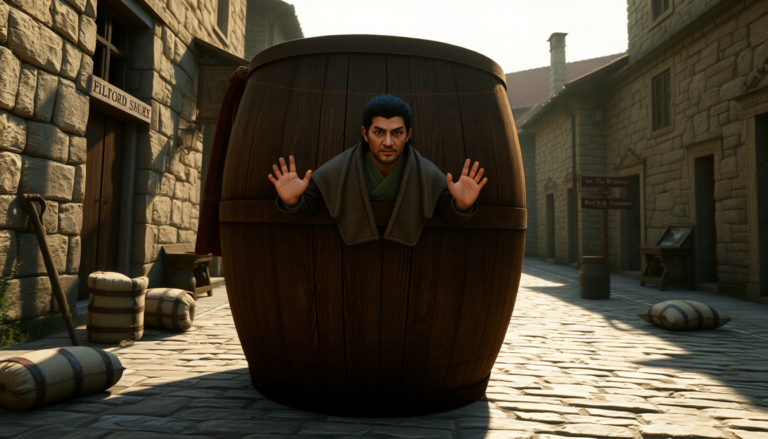Argomenti trattati
When it comes to role-playing games, dialogue isn’t just a way to communicate; it’s a powerful vehicle for storytelling and character development. Take, for instance, the first expansion of *Pillars of Eternity*, known as *The White March: Part One*. Here, a seemingly straightforward interaction with the character Zahua sparks profound existential reflection. After players defend the town of Stalwart from an ogre onslaught, they encounter Zahua—a martial artist literally trapped in a barrel. His opening question, “Are you real?” sets the tone for a humorous yet thought-provoking dialogue that lingers in players’ minds long after they’ve put down the controller.
Who is Zahua?
Zahua is far from an ordinary character; he’s a delightful mix of humor and wisdom that draws players in. Described as a weary warrior hailing from a forgotten culture, Zahua embodies the duality of a religious ascetic and a carefree spirit. His introduction is anything but typical—found in a barrel of fish, his peculiar situation immediately raises questions about his nature and purpose. This quirky entrance acts as a narrative icebreaker, paving the way for deeper discussions on identity and existence.
Eric Fenstermaker, the mind behind Zahua’s character, designed this unique introduction to mirror the monk’s journey toward detachment from the material world. He shared, “I wanted to introduce him in a way that you could see immediately through his actions who he was.” This approach forges an instant connection between Zahua and the player, inviting them to explore not only his world but also their own character’s identity.
The Impact of Dialogue Choices
The dialogue options presented when Zahua asks, “Are you real?” add layers of complexity to the interaction. Choices like “[Lie] Yes” introduce humor while hinting at deeper existential themes. This option implies an awareness of one’s own façade, reflecting an internal struggle with self-identity. Fenstermaker acknowledges the comedic intent behind this line, stating, “If the NPC is allowed to reject reality, shouldn’t the player also be allowed?” This exchange emphasizes the freedom players have in RPGs to articulate their character’s beliefs and feelings.
Moreover, the variety of responses available showcases the game’s commitment to player agency. By allowing players to engage in a light-hearted yet profound conversation, the developers encourage exploration of Zahua’s psyche. As Fenstermaker highlights, the essence of RPG dialogue lies in enabling players to express themselves and discover traits they may not have realized about their characters.
Reactivity and Player Engagement
Even though Fenstermaker wished for more reactive dialogue options, the existing exchange between Zahua and the player strikes a solid balance between humor and philosophical inquiry. He acknowledges that while deadlines presented challenges, prioritizing player expression remains crucial. “Building on that gag could’ve paid off even bigger,” he reflected, expressing a desire for more extensive reactions from Zahua based on players’ choices.
This equilibrium between structured narrative and player freedom is a hallmark of effective RPG design. Players engage with the story on a personal level, often reflecting on their choices and the implications of those choices within the game’s context. This level of engagement is what makes Zahua’s introduction so memorable and impactful, resonating long after the game has concluded.
Conclusion: The Legacy of Zahua
In wrapping up, Zahua’s character and his iconic question encapsulate the unique blend of humor and depth that defines *Pillars of Eternity*. The dialogue serves not only as a comedic interlude but also as an opportunity for players to engage with complex themes of reality and identity. As players navigate through the game, they’re invited to reflect on their experiences, making Zahua’s introduction a standout moment in RPG storytelling.
As the gaming community continues to celebrate the legacy of *Pillars of Eternity*, Zahua stands as a testament to the power of dialogue in crafting memorable and thought-provoking experiences. So, the next time you dive into an RPG, consider how the conversations you have shape not just your character, but your entire gaming experience.

